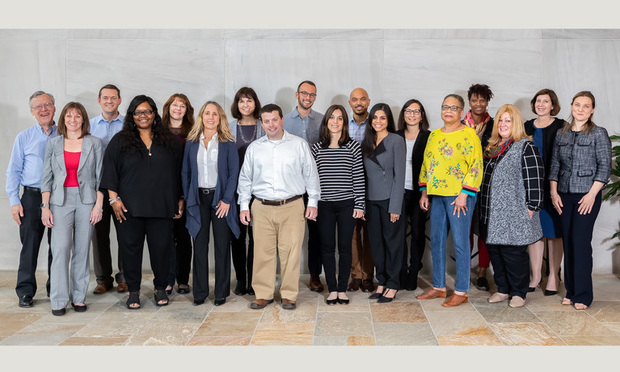Dun & Bradstreet Pro Bono Program Develops Into Corporate Responsibility Function in 2018
"Last year our legal team expanded the scope of our pro bono program from a legal department pet project to a formal Corporate Social Responsibility function."
May 31, 2019 at 04:37 PM
5 minute read
 Front row (left to right): Janet Parkhurst, DeShawn Johnson, Lisa Schor Babin, Gary O'Malley, Antigoni Lazarou, Smrithi Mohan, Karen Pettiford-Wilson, Carol Guerriero, Natalia Shishkin. Back row (left to right): Aryeh Friedman, Bob Kanapka, Cheryl Bock, Juliana Spofford, John LoForese, Andre Reilly, Marjorie Scariati, Sage Knight, Shirin Saks. – Photo by Carmen Natale/ALM
Front row (left to right): Janet Parkhurst, DeShawn Johnson, Lisa Schor Babin, Gary O'Malley, Antigoni Lazarou, Smrithi Mohan, Karen Pettiford-Wilson, Carol Guerriero, Natalia Shishkin. Back row (left to right): Aryeh Friedman, Bob Kanapka, Cheryl Bock, Juliana Spofford, John LoForese, Andre Reilly, Marjorie Scariati, Sage Knight, Shirin Saks. – Photo by Carmen Natale/ALM
Dun & Bradstreet's Global Legal Team launched its pro bono program, working with Pro Bono Partnership, in 2016. As of early this year, 17 lawyers and staff had volunteered for 26 different nonprofits on 33 legal matters through the program, Short Hills-based D&B said, handling legal tasks such as trademark registration and compliance. In 2018, as detailed below, the legal department expanded the pro bono program, including a new partnership that leveraged the department's legal expertise along with the company's data and analytics capabilities.
** The responses were provided by the department as a group and coordinated by Assistant General Counsel Robert Kanapka. **
What are the department's proudest pro bono achievements of 2018, and why?
Dun & Bradstreet strives to be an outstanding global corporate citizen, and our approach is rooted in our values. We aim to be generous with our time and resources to identify new ways to mobilize data to make the greatest impact on the underserved and underrepresented. Dun & Bradstreet's “Do Good” program has been the cornerstone of our company-wide efforts. Last year our legal team expanded the scope of our pro bono program from a legal department pet project to a formal Corporate Social Responsibility function. Overall, our proudest achievement has been the cultivation of the “Do Good” culture across the business, leveraging not just legal skills, but Dun & Bradstreet's data, analytics, and marketing expertise to positively impact the business and the world. In October 2018, the company announced a strategic partnership with the Virtue Foundation that integrates Dun & Bradstreet data and analytics with Virtue Foundation's Data Mapping Initiative. D&B's data helps to power the Virtue Foundation's tool to map the developing world to identify health-care needs against available resources. This initiative combined in-house legal resources with content and analytics experts to get this partnership off the ground. This project and other “Do Good” activities around the world were included in the company's recently issued first Corporate Social Responsibility Annual Report. Documenting our CSR impact involved developing the methodology to record, reinforce, and expand the individual and collective contributions of employees across the company—including pro bono work, philanthropy, community support, and sustainability efforts.
We've seen numerous examples of change and evolution in how in-house departments function. What has been the team's experience with change, and how has it adapted?
The legal department is expected to operate like a business—globally, without silos, and held to performance standards and metrics. Tasked with developing better ways to track, respond to, and ultimately reduce legal issues, our department integrated across time zones and systems, developed knowledge-management capabilities, adopted key performance indicators, and leveraged technology to automate processes. This was not an overnight process—it still continues—but the company and legal department leadership have prioritized and role-modeled this evolution.
What is the most effective time-management tool or technique your team employs? How important is that when trying to make a pro bono impact?
We believe that people are inherently good and eager to make positive impacts in their communities. Day-to-day obligations of work and family, however, can often get in the way. With that consideration, early in the development of our pro bono program, we made it easy for people to “do good” by implementing systems and processes that compile, coordinate and track opportunities, which has led to increased pro bono and Do Good participation across the company.
What is your best advice for in-house lawyers trying to make an impact, with their corporate clients, their communities, and beyond?
Take the initiative to reach out! There are amazing partners ready and willing to offer their expertise in setting up a program to make a difference—organizations like Pro Bono Partnership, law firms with which you're currently working, customers and partners, and nonprofits (some of which you may ultimately end up supporting.)
What's the most important thing for outside counsel to know about working with in-house lawyers?
In-house lawyers need to make consequential decisions. The most important thing outside counsel can do for support, especially in areas where in-house counsel may not have the depth of experience, is to frame-out the universe of issues involved in the decision and narrow the range of reasonable answers. Make those important decisions easier to make, not harder.
This content has been archived. It is available through our partners, LexisNexis® and Bloomberg Law.
To view this content, please continue to their sites.
Not a Lexis Subscriber?
Subscribe Now
Not a Bloomberg Law Subscriber?
Subscribe Now
NOT FOR REPRINT
© 2025 ALM Global, LLC, All Rights Reserved. Request academic re-use from www.copyright.com. All other uses, submit a request to [email protected]. For more information visit Asset & Logo Licensing.
You Might Like
View All
Lack of Jurisdiction Dooms Child Sex Abuse Claim Against Archdiocese of Philadelphia, Says NJ Supreme Court
5 minute read
Loopholes, DNA Collection and Tech: Does Your Consent as a User of a Genealogy Website Override Another Person’s Fourth Amendment Right?
Trending Stories
Who Got The Work
J. Brugh Lower of Gibbons has entered an appearance for industrial equipment supplier Devco Corporation in a pending trademark infringement lawsuit. The suit, accusing the defendant of selling knock-off Graco products, was filed Dec. 18 in New Jersey District Court by Rivkin Radler on behalf of Graco Inc. and Graco Minnesota. The case, assigned to U.S. District Judge Zahid N. Quraishi, is 3:24-cv-11294, Graco Inc. et al v. Devco Corporation.
Who Got The Work
Rebecca Maller-Stein and Kent A. Yalowitz of Arnold & Porter Kaye Scholer have entered their appearances for Hanaco Venture Capital and its executives, Lior Prosor and David Frankel, in a pending securities lawsuit. The action, filed on Dec. 24 in New York Southern District Court by Zell, Aron & Co. on behalf of Goldeneye Advisors, accuses the defendants of negligently and fraudulently managing the plaintiff's $1 million investment. The case, assigned to U.S. District Judge Vernon S. Broderick, is 1:24-cv-09918, Goldeneye Advisors, LLC v. Hanaco Venture Capital, Ltd. et al.
Who Got The Work
Attorneys from A&O Shearman has stepped in as defense counsel for Toronto-Dominion Bank and other defendants in a pending securities class action. The suit, filed Dec. 11 in New York Southern District Court by Bleichmar Fonti & Auld, accuses the defendants of concealing the bank's 'pervasive' deficiencies in regards to its compliance with the Bank Secrecy Act and the quality of its anti-money laundering controls. The case, assigned to U.S. District Judge Arun Subramanian, is 1:24-cv-09445, Gonzalez v. The Toronto-Dominion Bank et al.
Who Got The Work
Crown Castle International, a Pennsylvania company providing shared communications infrastructure, has turned to Luke D. Wolf of Gordon Rees Scully Mansukhani to fend off a pending breach-of-contract lawsuit. The court action, filed Nov. 25 in Michigan Eastern District Court by Hooper Hathaway PC on behalf of The Town Residences LLC, accuses Crown Castle of failing to transfer approximately $30,000 in utility payments from T-Mobile in breach of a roof-top lease and assignment agreement. The case, assigned to U.S. District Judge Susan K. Declercq, is 2:24-cv-13131, The Town Residences LLC v. T-Mobile US, Inc. et al.
Who Got The Work
Wilfred P. Coronato and Daniel M. Schwartz of McCarter & English have stepped in as defense counsel to Electrolux Home Products Inc. in a pending product liability lawsuit. The court action, filed Nov. 26 in New York Eastern District Court by Poulos Lopiccolo PC and Nagel Rice LLP on behalf of David Stern, alleges that the defendant's refrigerators’ drawers and shelving repeatedly break and fall apart within months after purchase. The case, assigned to U.S. District Judge Joan M. Azrack, is 2:24-cv-08204, Stern v. Electrolux Home Products, Inc.
Featured Firms
Law Offices of Gary Martin Hays & Associates, P.C.
(470) 294-1674
Law Offices of Mark E. Salomone
(857) 444-6468
Smith & Hassler
(713) 739-1250








